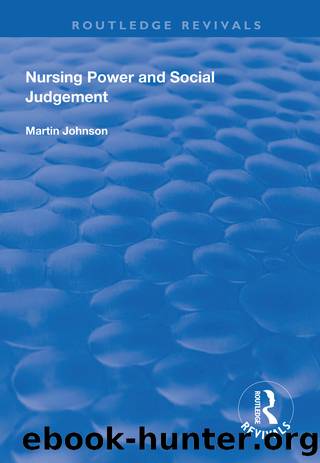Nursing Power and Social Judgement by Martin Johnson

Author:Martin Johnson [Johnson, Martin]
Language: eng
Format: epub
Tags: Social Science, Sociology, General
ISBN: 9780429825378
Google: nKubDwAAQBAJ
Publisher: Routledge
Published: 2018-08-20T03:40:13+00:00
Even in more practised hands than my own, this work is very demanding physically and emotionally. Sometimes, particularly at busy times, student nurses felt that even negotiating for someone to help with these activities could be awkward, as Susan suggested: "You've got to get someone out of the office to give you a hand." As a result of this, and the dilemma of having to disturb more senior or busy staff to get the work done, such work is stressful and likely to render patients who need it less popular, at least in this respect.
It now seems important also to note the presence of another situation of dual evaluation. By this I mean the possibility of carrying both negative and positive labels. Sam Read was a good example indeed. As a person, despite his need for fairly constant attention and his assertiveness in identifying his needs, he was undoubtedly popular. As a task, an item of physical and emotional labour, however reductive this view might be, he was much less than popular.
Kratz (1974) carried out a detailed participant observation study of the care, in the community, of stroke patients. Direct analytic comparisons would be unhelpful si ice by definition, even allowing for a shift in policy over admissions, most of her sample was not in need of hospital care. Nevertheless her analytic categories did include that of 'waiting to go into hospital'. Others were 'seriously ill', 'really getting better' and 'not getting better'. Of these, those patients defined as 'not getting better' were least likely to be highly valued as clients and to receive knowledgeable care. At this point of my analysis these concepts seem to have limited power to explain popularity and unpopularity. This may be because with other notions, such as medical diagnosis, they are but elements in a complex chemistry of social judgement.
Patients' social class, or perhaps more accurately, level of educational attainment, seemed to be a relatively weak determinant of evaluative labelling so far as nurses were concerned. Doug Whitbread was a retired bus driver who did not seem to obey the nurses' rules of good conduct yet, as I have noted, remained popular with them through a more subtle interplay of social skills and stoical and charismatic behaviour. Charles Eastwood was a professional/managerial level engineer. Yet he was, at least as far as one could tell from ward and office discussions, very unpopular.
Although a detailed survey of the social origins of nursing staff would not have been appropriate, it was clear that those on the unit were predominantly of classes 1 and 2 (intermediate and professional managerial) of the widely used Registrar General Classification (OPCS, 1990).
In her interview with me, Anita (3rd year student) suggested that as far as she could tell social class was not an important factor in determining patients' popularity among nursing staff. She was less certain of medical staff however. Indeed she felt that nursing staff had a role to play in ensuring parity of access, particularly in respect of information disclosed by medical staff:
Anita: .
Download
This site does not store any files on its server. We only index and link to content provided by other sites. Please contact the content providers to delete copyright contents if any and email us, we'll remove relevant links or contents immediately.
| Administration & Medicine Economics | Allied Health Professions |
| Basic Sciences | Dentistry |
| History | Medical Informatics |
| Medicine | Nursing |
| Pharmacology | Psychology |
| Research | Veterinary Medicine |
Machine Learning at Scale with H2O by Gregory Keys | David Whiting(4313)
Fairy Tale by Stephen King(3400)
Will by Will Smith(2922)
Hooked: A Dark, Contemporary Romance (Never After Series) by Emily McIntire(2556)
Rationality by Steven Pinker(2367)
Friends, Lovers, and the Big Terrible Thing by Matthew Perry(2231)
The Becoming by Nora Roberts(2205)
Love on the Brain by Ali Hazelwood(2079)
A Short History of War by Jeremy Black(1849)
HBR's 10 Must Reads 2022 by Harvard Business Review(1846)
The Strength In Our Scars by Bianca Sparacino(1845)
A Game of Thrones (The Illustrated Edition) by George R. R. Martin(1750)
Leviathan Falls (The Expanse Book 9) by James S. A. Corey(1746)
515945210 by Unknown(1668)
Bewilderment by Richard Powers(1622)
443319537 by Unknown(1560)
The 1619 Project by Unknown(1462)
The Real Anthony Fauci: Bill Gates, Big Pharma, and the Global War on Democracy and Public Health (Childrenâs Health Defense) by Robert F. Kennedy(1409)
All About Love: New Visions by bell hooks(1355)
